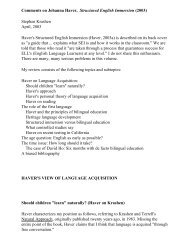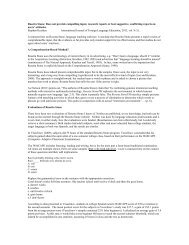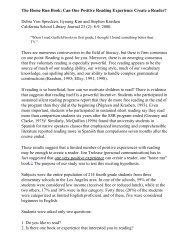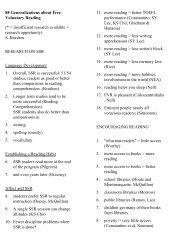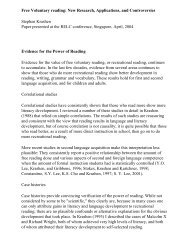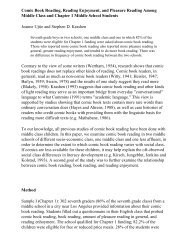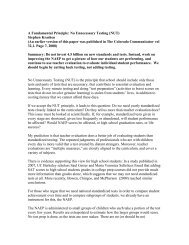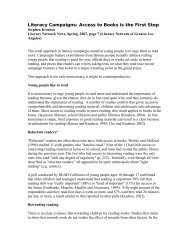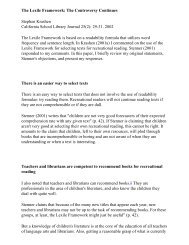Second Language Acquisition and Second ... - Stephen Krashen
Second Language Acquisition and Second ... - Stephen Krashen
Second Language Acquisition and Second ... - Stephen Krashen
You also want an ePaper? Increase the reach of your titles
YUMPU automatically turns print PDFs into web optimized ePapers that Google loves.
predict differences in student achievement (S. Sapon, personal communication),<br />
because efficient acquisition is taking place for all students.<br />
Notes<br />
1 The presence of such a filter may explain why some foreign language students behave like<br />
patients with bilateral hippocampal lesions. Stevick (1976) notes that such patients "are<br />
perfectly normal in intelligence, <strong>and</strong> they can remember the words <strong>and</strong> language skills that<br />
they had before the operation. Further, they have no difficulty in hearing, underst<strong>and</strong>ing, <strong>and</strong><br />
repeating new information as long as they keep on repeating it. They are different from other<br />
people in only one respect: if their repetition of the new material is interrupted in any way,<br />
they forget it immediately ..." (pp. 6-7). Moreover, "the behavior of these patients is<br />
embarrassingly similar to the classroom behavior of our students" (p. 7).<br />
2 We might say that the instrumental acquirer or learner "fossilizes" (Selinker, 1972), or ceases<br />
progress when he perceives that communicative needs are met. The integrative<br />
acquirer/learner fossilizes when he perceives that his social needs are met.<br />
3 While attitudinal effects are, it is hypothesized, directly related to acquisition, they may<br />
certainly be indirectly related to conscious learning. For example, the integratively motivated<br />
student might clearly be willing to spend more time <strong>and</strong> effort in conscious learning,<br />
especially if he has been taught that such an effort is useful. Also, there are conditions under<br />
which high aptitude may lead to acquisition, albeit indirectly. The high-aptitude student<br />
probably feels drawn toward learning; such learning may have very satisfying results in terms<br />
of the rapid sort of progress it seems to give at first. In terms of Monitor Theory, this is not<br />
real progress--it may produce "language-like" behavior, achieved by the use of the first<br />
language as a substitute utterance initiator with Monitor repairs (the L1 + Monitor mode;<br />
<strong>Krashen</strong>, 1977a). In addition to the affective benefit the use of this mode may have, it may<br />
indirectly encourage acquisition by drawing more intake to the performer. Use of this mode<br />
may allow the performer some degree of interaction with second language speakers. The use<br />
of routines <strong>and</strong> patterns also does this <strong>and</strong> may also encourage intake (Fillmore, 1976;<br />
<strong>Krashen</strong> <strong>and</strong> Scarcella, 1978). (Part of this input may be the pseudo-language of others. The<br />
mechanism used by the speaker in producing someone else's input, of course, make no<br />
difference to the hearer, however, <strong>and</strong> it is legitimate input.)<br />
4 For example, one attitudinal test used by Garner <strong>and</strong> Lambert (1959) asked students to rank<br />
four possible reasons for studying French:<br />
Knowledge of French would<br />
1. be useful in obtaining a job,<br />
2. be helpful in underst<strong>and</strong>ing the French-Canadian people <strong>and</strong> their way of life,<br />
3. permit meeting <strong>and</strong> conversing with more <strong>and</strong> varied people,<br />
4. make one a better educated person.<br />
A fifth alternative, "any other personal reason", was also permitted. Gardner <strong>and</strong> Lambert explain that "S's who<br />
ranked either alternative (2) or (3) as most relevant were classified as 'integratively oriented". Those choosing either<br />
(1) or (4) were classified as 'instrumentally oriented'. Those choosing alternative (5) were not classified" (p. 193)<br />
39



